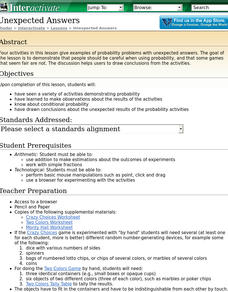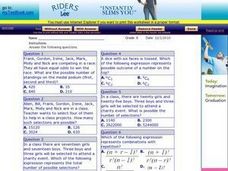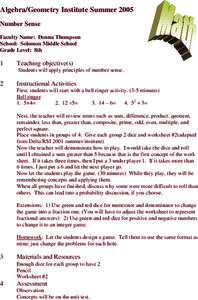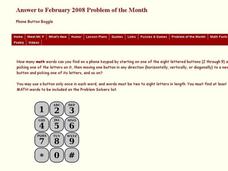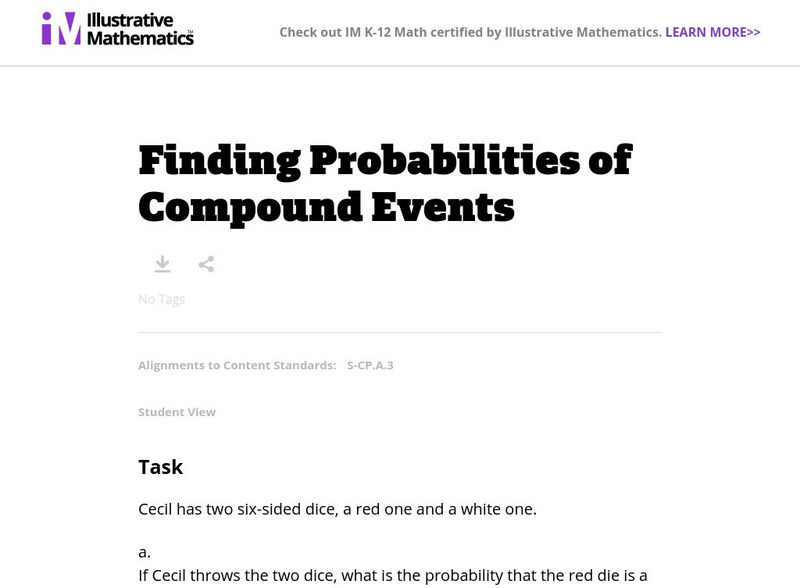Curated OER
Unexpected Answers
Students consider probability problems with unexpected and surprising answers.
Curated OER
Chance Dance Compositions
Fourth graders create dances through a randomly generated process (such as throwing a dice) and perform their dances for the class. Class work is based on Merce Cunningham's "Chance Dance" and includes walking, skipping hopping, and...
Curated OER
What Are the Risks?
Young scholars use dice to determine the risk of being exposed to radon. They practice using new vocabulary related to probability and ratios. They make predictions about the results and record their observations.
Curated OER
Counting Principle
In this counting principle instructional activity, students solve 10 problems by applying the counting principle to each one. First, they determine the number of possible outcomes in a coin toss. Then, students the number of different...
Curated OER
Tree Diagrams
In this tree diagram worksheet, students read story problems. From the given information, they draw tree diagrams to determine the total possible number of outcomes. This one-page worksheet contains ten problems.
Curated OER
Combinations & Permutations
In this combination and permutations instructional activity, learners identify possible outcomes. They determine if the given situation is a combination or permutation and solve accordingly. This one-page instructional activity...
Curated OER
Number Sense
Eighth graders participate in a lesson that is concerned with reviewing basic math concepts using the four operations. The activity is composed of a math game that is played by them.
Curated OER
The Fair Factor
Students participate in playing many games to determine if they are fair or not. They create their own game that is fair to play with their classmates.
Curated OER
Rules of Sign Change
Students manipulate negative and positive numbers. In this integers lesson, students move through three activities exploring negative and positive whole numbers. A number line, cardboard function representation, and solving expressions...
Curated OER
Mirror Writing
In this mirror writing worksheet, students follow the directions to decide which alphabet letters are symmetrical. Students use a mirror and a white light as they work in partners to trace simple shapes.
Curated OER
Phone Button Boggle
In this phone button boggle worksheet, learners identify the number of math words they can find on a phone keypad according to given directions. This one-page worksheet contains one problem. Answers are provided.
Curated OER
Niels Bohr
In this online interactive history instructional activity, students respond to 9 short answer and essay questions about the achievements of Niels Bohr. Students may check some of their answers on the interactive instructional activity.
Curated OER
Statistics and Probility
Seventh graders collect data and make predictions. In this geometry lesson, 7th graders work in tiers collecting data and plotting it. They make inferences and predictions about their collected data.
Curated OER
What's Ponytail's Big News?
Pupils discuss reasons to not smoke. In this anti-smoking lesson, students listen to a story where the character Ponytail the pony doesn't smoke and is thus able to engage in physical activities. They create Ponytail's pinwheel with a no...
Shodor Education Foundation
Shodor Interactivate: Racing Game With Two Dice
Simulate a game where "N" players roll two dice, and the lucky player has an advantage for reaching the finish.
Illustrative Mathematics
Illustrative Mathematics: 7.sp Rolling Dice
Roll two dice 10 times. After each roll, note whether any sixes were observed and record your results in the table below. Aligns with 7.SP.C.7.
TED Talks
Ted: Ted Ed: The Last Banana: A Thought Experiment in Probability
Imagine a game played with two players and two dice: if the biggest number rolled is one, two, three, or four, player 1 wins. If the biggest number rolled is five or six, player 2 wins. Who has the best probability of winning the game?...
Illustrative Mathematics
Illustrative Mathematics: 7.sp.8 Tetrahedral Dice
Many games use dice which are six-sided and fair (meaning each face on the die is equally likely to land face up). Many games also use the sum of two dice rolled at the same time to determine movement of game pieces. However, not all...
Shodor Education Foundation
Shodor Interactivate: Experimental Probability
Experiment with probability using a fixed size section spinner, a variable section spinner, two regular 6-sided dice or customized dice.
Illustrative Mathematics
Illustrative Mathematics: S cp.a.3: Finding Probabilities of Compound Events
Cecil has two six-sided dice, a red one and a white one. Aligns with S-CP.A.3.
CK-12 Foundation
Ck 12: Algebra Ii: 5.1 Sample Spaces and Probability
This section explores how to determine the sample space, or possible outcomes, for an event such as rolling dice. It also investigates how to determine the probability of different outcomes occurring for an activity such as flipping a...
SMART Technologies
Smart: Dice and Card Math Games
Kids love dice and playing with decks of cards. Leverage these two great (and inexpensive tools) to help students work on math facts, place value and more.
ClassFlow
Class Flow: Donkey Derby Handling Data
[Free Registration/Login Required] Can you list all probabilities when two dice are thrown? Run your own race here and see which donkey wins.
California State University
Cal State San Bernardino: Intro to Probability Models
The concept of random variables comes to life with this Applet used to roll one, two, six, or nine dice. The user selects the number of rolls to be completed, and the program quickly counts and graphs the results.


